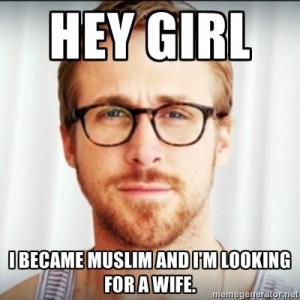
Meme – Via Buzzfeed.
One of my very first projects at Muslimah Media Watch was to review dating sites. The experience of discussing how we use technology to find a mate (here, here, here and here) baffled me a little because of the gendered and racialized aspects that I found while doing research. Later on, I also discovered that the bulk of people profiting from these sites are men, which added to my discomfort. A few years later, I had the opportunity to review Hipster Shaadi, which later evolved into Ishqr. This site aims to target young Western Muslims while helping them explore marriage without the pressure that other sites bring along.
At the time I was in a committed, long-term relationship, which perhaps allowed me to focus on the details of the process rather than the experience itself. But since I have decided to get “back on the horse” of “dating,” “mingling,” “meeting people” or whatever you want to call it, my experience has been rather awkward — and keep in mind that I am not adding the complexities of non-heterosexual or non-cisgender relationships.
Every time I open Facebook, I am faced with a myriad of articles about dating and relationships. Whether it is Muslim sites telling me how to find love without dating or The Daily Beast saying that Western Muslims are “different” than everyone else and do not like “old-country values,” these types of articles make me feel inadequate because, come on! I am single! These days, my newsfeed often challenges my identity as a “single” person, speculating about my past, my choices and my future wants. Thankfully there are also many wonderful pieces out there, which indicate to me that I am not alone in this process. For instance, Ghazala Irshad makes hilarious points about Muslim online dating while Everyday Feminism has many wise things to say about the single experience.
Similarly, Zainab Chaudary wrote a wonderful piece about her very own process of embracing singlehood rather than rushing to a partner for the sake of it. And as I read her article I cannot help but wondering about expectations. See, I already had a partner. We were together for almost eight years and went through a lot. I already did what Chaudary advises against in her writing; I was “a half,” I compromised, I sacrificed, I settled and, other than the good memories, I have nothing to show for it.
As I keep telling my girlfriends, I went into that relationship when I was 18, dreamy and stupid. If I met my previous partner today, chances are we would not be together, and that is because my expectations have changed. These days I keep thinking that if I am going to couple up with someone, I need more than just “chemistry” and the promise of a “good Muslim husband.” Nonetheless, my singlehood is still mediated by my association not only to a Muslim community, but to my patriarchal Latin American background and patriarchal Western understandings of love and relationships.
Let me tell you how this plays. As a Muslim, I am not supposed to date… but because I already had a partner, Muslim men are “a bit” uncomfortable around me or think that I should “settle” because of my past. At the same time, as a Mexican, I am expected not to make a move… all I have to do is to look pretty and a guy will find me. Of course, the issue is that when this happens, I get men who tell me they hate religious minorities and feminists, after asserting their financial superiority (because hello! Who wants a woman who makes more money?). On the Western side, meeting people is a very hard thing, particularly when you follow the neoliberal creed of success and have a job while attending school… Social spaces are also mediated by many other dynamics, one of which is that many men feel intimidated by smart, educated, working women of colour… Race, class, gender and white privilege intersect in very uncomfortable ways. At the same time, this very context tells you that if you are single for a long time, you are a less successful woman despite your accomplishments.

Ryan Goslin meme – Via Huffington Post
The focus on how to find a mate while Muslim and Western, as shown by media articles on dating apps or articles justifying online dating, is an important one, but it detracts from a bigger issue. For many women, including a whole generation of women of colour who identify as Muslim, the problem is not “finding” someone, but addressing expectations. We don’t really talk about why “dating” may be appropriate, why telling women that they should NOT settle may be empowering or why letting communities define what relationships should be can be problematic. Instead, we focus on the “this man is husband material (or not) type of talk. Take for instance the memes about Muslim marriage or relationships. Even the tongue in cheek ones, like the “Muslim Ryan Gosling” Tumblr make me wonder. What are we supposed to make of these memes featuring extremely good looking men (like the ones featured in this post), assuring their qualifications as “good husbands.” What does it mean to be a “good husband”? Or “husband material”?
These memes, along with many of the articles about Muslim “dating,” set expectations for us while denying us the opportunity to acknowledge out pasts and looking forward to partnerships that fulfill us without making us a “half.” Sadly, as Muslim women of colour, usually with intersecting identities, it is still us who are anticipated to “adapt,” to “settle” and to adjust our expectations to those portrayed in the media and memes.
